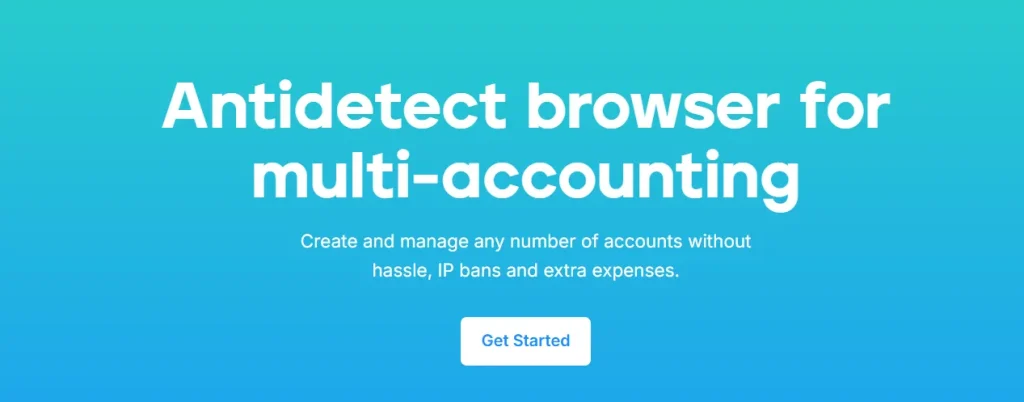In this digital world, digital fingerprinting plays a critical role in tracking, security, and online identity. While it can enhance personalization and fraud detection, it also creates challenges for individuals and businesses managing multiple accounts or requiring privacy.
This is where the power of an antidetect browser such as Octo Browser comes into play, providing unparalleled protection, authenticity, and efficiency in managing digital identities.
In this blog post, I will explain what an antidetect browser is and how it helps in digital marketing campaigns.
What is an Antidetect Browser & How It Works

An antidetect browser is a specialized browser that, unlike conventional browsers like Google Chrome or Firefox, allows you to freely modify and hide the “browser fingerprints” sent to websites.
Browser fingerprinting is a set of information derived from various combinations of elements related to a user’s device and environment, which helps website operators uniquely identify users.
This includes OS type, browser version, installed fonts, screen resolution, GPU information, time zone, language settings, etc. By default, this information is automatically included and transmitted in browser communications, so even if you are not logged into a website, it can be used to identify that a series of accesses comes from a specific person.
However, using an antidetect browser, it is possible to replace this information with other (random or arbitrary) values. As a result, even if the same person accesses the site, they will be more easily recognized as “different users” by the service.
Typical antidetect browsers allow access by impersonating “specific fictitious individuals” by recording a large number of these random browser fingerprints as presets.
Background to the Expansion of the Use of Antidetect Browsers
A representative example of the use of antidetect browsers is online marketing, including advertising management.
As an example of the application of antidetect browsers, information mining using different personas in market research or competitive analysis is easy to understand. Various virtual users are constructed with other regions, genders, and interests in mind, enabling the deployment of high-level intelligence activities, such as the full exposure of competitors’ advertising strategies.
Additionally, antidetect browser are often used in areas that require a high level of anonymity or independence (which may include questionable cases). In other words, the scope of application of antidetect browsers goes far beyond the general marketing field and functions as a powerful tactical tool to artificially create “influence” and “profits” themselves in the digital space and overcome all constraints.
Key Features of Antidetect Browsers
The strength of antidetect browsers lies not simply in anonymization tools, but in a set of advanced features for creating extremely sophisticated digital “alternative personalities.” The core of this is concentrated on the trinity of functions: “browser fingerprinting,” “comprehensive profile separation and management,” and “strategic IP address assignment.” Working together, these functions allow a single user to act as if they were countless different people scattered around the world.
1- Complete masking of browser fingerprints
Websites collect enormous amounts of information sent by your browser to identify who you are. This is called “browser fingerprinting” and is contributed not only by the type of OS and browser, but by a combination of very diverse elements. For example, the following can be cited:
- Hardware Information (Canvas/WebGL Fingerprinting): Depending on the computer’s graphics card and drivers, slight pixel-level “bleeding” or “habits” may occur during browser rendering. Antidetect browsers intentionally add other noise to these minor rendering results, making hardware-level identification completely impossible.
- Environmental information (fonts, time zone, language settings): The combination of installed fonts and time zone/language settings can serve as a more unique identifier than one might think. For example, the combination “English Windows environment with many specialized Chinese design fonts installed” can locate an individual with considerable accuracy among users worldwide. Antidetect browsers optimize this information for each profile. For example, for a profile of “male Mac user residing in Los Angeles,” they perform meticulous masking, returning only Pacific Standard Time (PST), English settings, and the standard font groups built into macOS.
This allows a “Windows user from New York” to impersonate a “Mac user from London” or an “Android user from Singapore” with a single button press.
2- Profile management and data separation
What’s important next is the profile management feature that completely separates each “alternative personality” from activity history. While standard browsers (e.g., Google Chrome) also have profile functions, this is only a simplistic separation for convenience. On the other hand, profiles in antidetect browsers each function as independent, “containerized”.
3- Strategic use of IP addresses (Proxy management)
Even if you mask the “terminal” with fingerprinting and “user activity” with profiles, if all access IP addresses are identical, the fact that it’s the same person will be immediately revealed. This is where proxy management, which assigns different IP addresses to each profile, becomes essential.
Antidetect browsers can configure individual proxy servers for each profile.
What’s particularly important is the type of proxies that can be used.
- Residential Proxy: IP addresses connected to the same internet lines as general households. They are rarely considered mechanical access and can impersonate “general users” with very high reliability.
- Mobile proxy: IP addresses from mobile phone operators’ networks. On platforms where smartphone access is central, such as social media, they are recognized as extremely natural users.
By combining these proxies, it becomes possible to design perfect alternative personalities that even include physical location information, such as “profile A uses a residential IP from New York” and “profile B uses a mobile IP from Paris”.
By organically combining these three functions, antidetect browsers do not function as simple tools but as a “platform that reproduces the digital environment of completely different people.”
Why Choose Octo Browser
Octo Browser is a premium service designed for users who need more secure, abundant phone numbers. Unlike the free version, Premium service numbers are never shared, ensuring complete confidentiality and a safer environment.
Currently, it connects to hundreds of thousands of numbers in over 40 countries, responding to requests, whether you need a specific country’s number or a large batch at once. Prices start at just a few cents per message, keeping costs low. We prioritize convenience by supporting a wide range of payment options.
Conclusion
For multiple accounts, Anti-Detect browser is not an option; it’s essential. Octo Browser is the best option for businesses and individuals.
Seamless workflow management, flawless fingerprint emulation, and Octo Browser. Can you help a lot? All the information available on the website you can visit and use. It’s a user-friendly browser that anyone can use.










